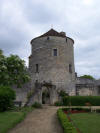

Michel Montaigne (1533-1592)
Montaigne’s birthright, childhood and life uniquely prepared him to develop a Renaissance Humanist world view. His father was wealthy, successful, politically powerful Catholic French aristocrat and his mother was born of Spanish Jewish, Catholic and Protestant descent. His parents first sent him to be raised by a local peasant family -- allegedly so that he would have a sense of the people he would someday govern -- and then he was raised on the family estate by a German tutor who spoke no French, and who would only speak Latin to him. Apparently his own family and servants would only speak either Latin or Greek to him. He grew up reading the Latin and Greek classics and by 13 had finished his education at a premier humanist (classic) boarding school.
Montaigne served in French politics during a period of bloody, brutal civil wars splitting France and all of Europe along religious lines – between the Catholic majority and Huguenots (French-Protestant minority). Several of his family members converted to Protestantism but Montaigne remained devoutly Catholic. He was, however, committed to toleration.
Relevant to "Of Cannibals", he lived in a era when he would have seen heretics tried, tortured and not infrequently burned at the stake in his town.
At around age 37 he famously more or less locked himself in a tower on the family estate, surrounded by c. 1,500 books and spent the next ten years working on his Essays.
The Essays
The subject of these essays is, he tells us, himself: what it is to
be human. Like Socrates he begins with skepticism: with questioning, with doubting and challenging through evidence
and reason our deepest held convictions; like Plato he attempts to find truth
through objective, rational enquiry devoid of ideology: "thus
we should beware of clinging to vulgar opinions, and judge things by reason's
way, not by popular say" (2190). In this way he is clearly not only interested in knowing about
himself and his world but, in the philosophical sense, knowing
about knowing: what kinds of truths is the human mind capable of grasping and
how do we go about thinking?
As you read in “Of Cannibals”, his style is stream of consciousness – he diverges and wanders wherever the idea takes him. In this way the style fits the topic, for the topic is intellectual freedom: a man attempting to set his mind free from all assumptions so that it may discover truth.
Modernism and, Perhaps, The Bard
Many believe that Montaigne possessed the first "modern" mind, and
certainly as we read him we should be struck by how radically different this
mind appears compared to nearly everything we've read this semester -- with the
exception of Plato.
Montaigne's Essays -- or more accurately how they approach the questions "what is it to be alive?" and "what is the origin of knowledge and thought itself?" -- inspire and shape the work of all the great philosophical works of the 16th-18th century, beginning with Descartes, Voltaire and Rousseau.
And when we listen to the great Shakespearean soliloquies -- when we hear Hamlet or Macbeth thinking out loud -- we hear the voice of Montaigne: a mind questioning everything around him. His essay "On Cannibals" is largely believed to have inspired Shakespeare's The Tempest.
http://plato.stanford.edu/entries/montaigne/